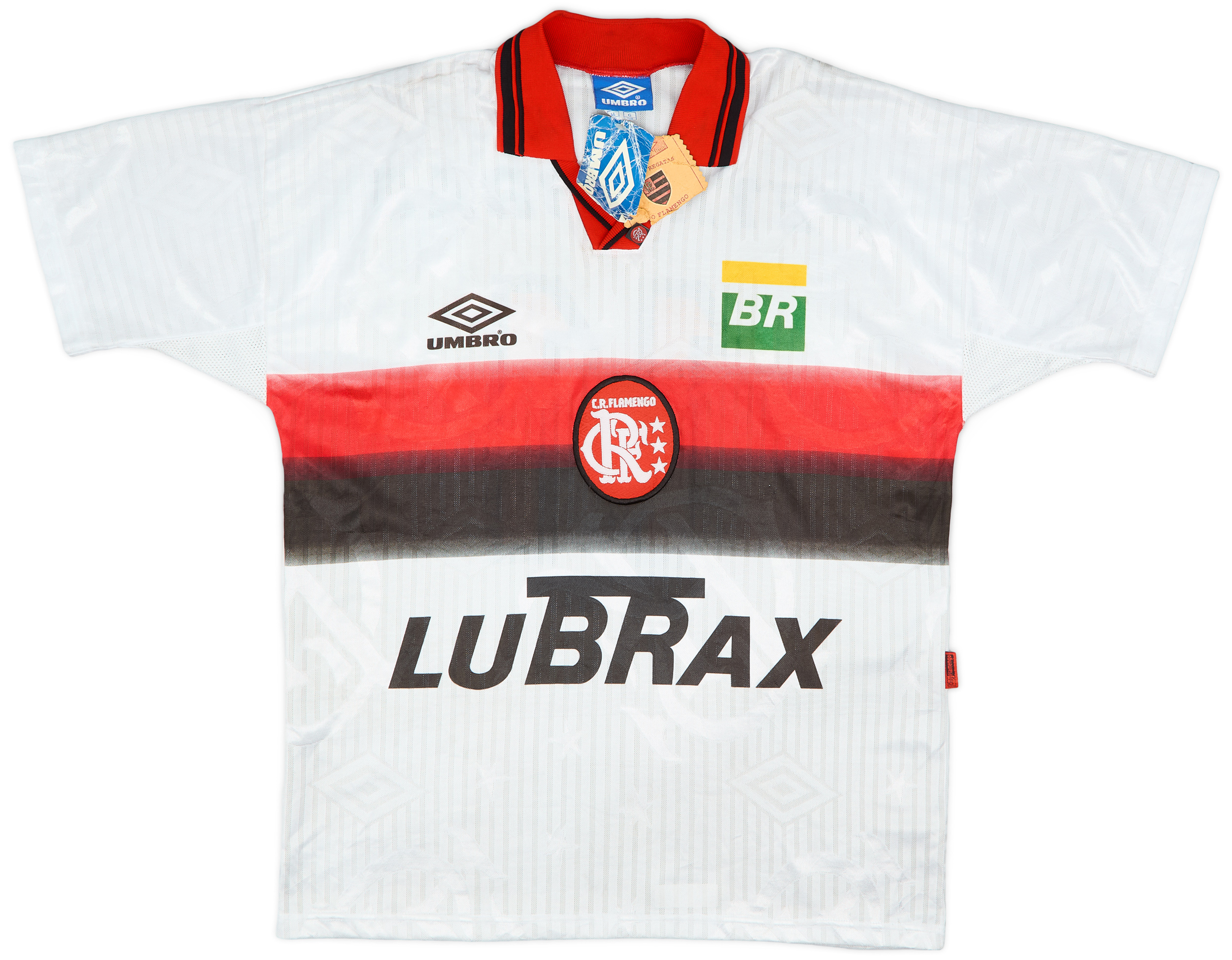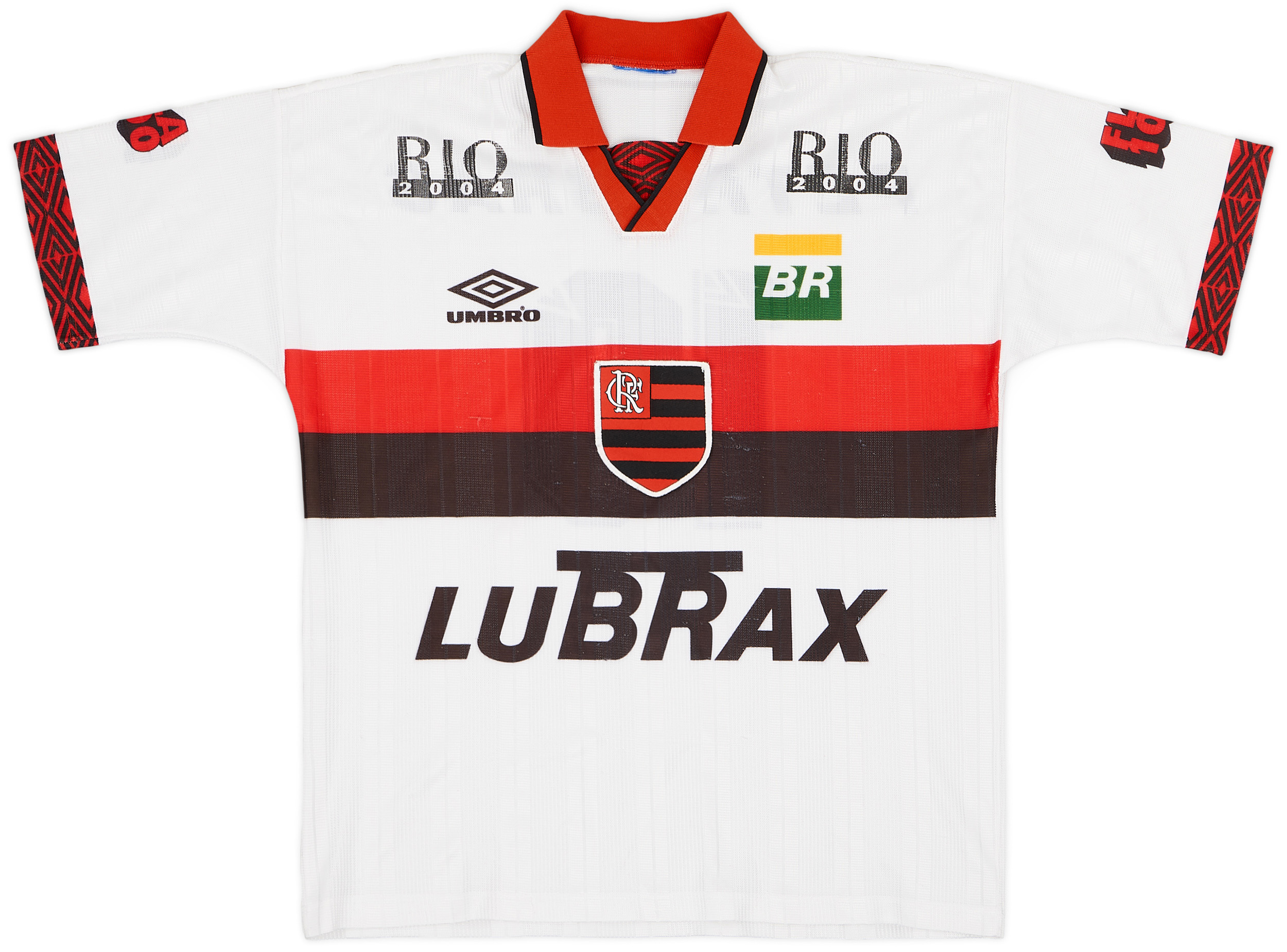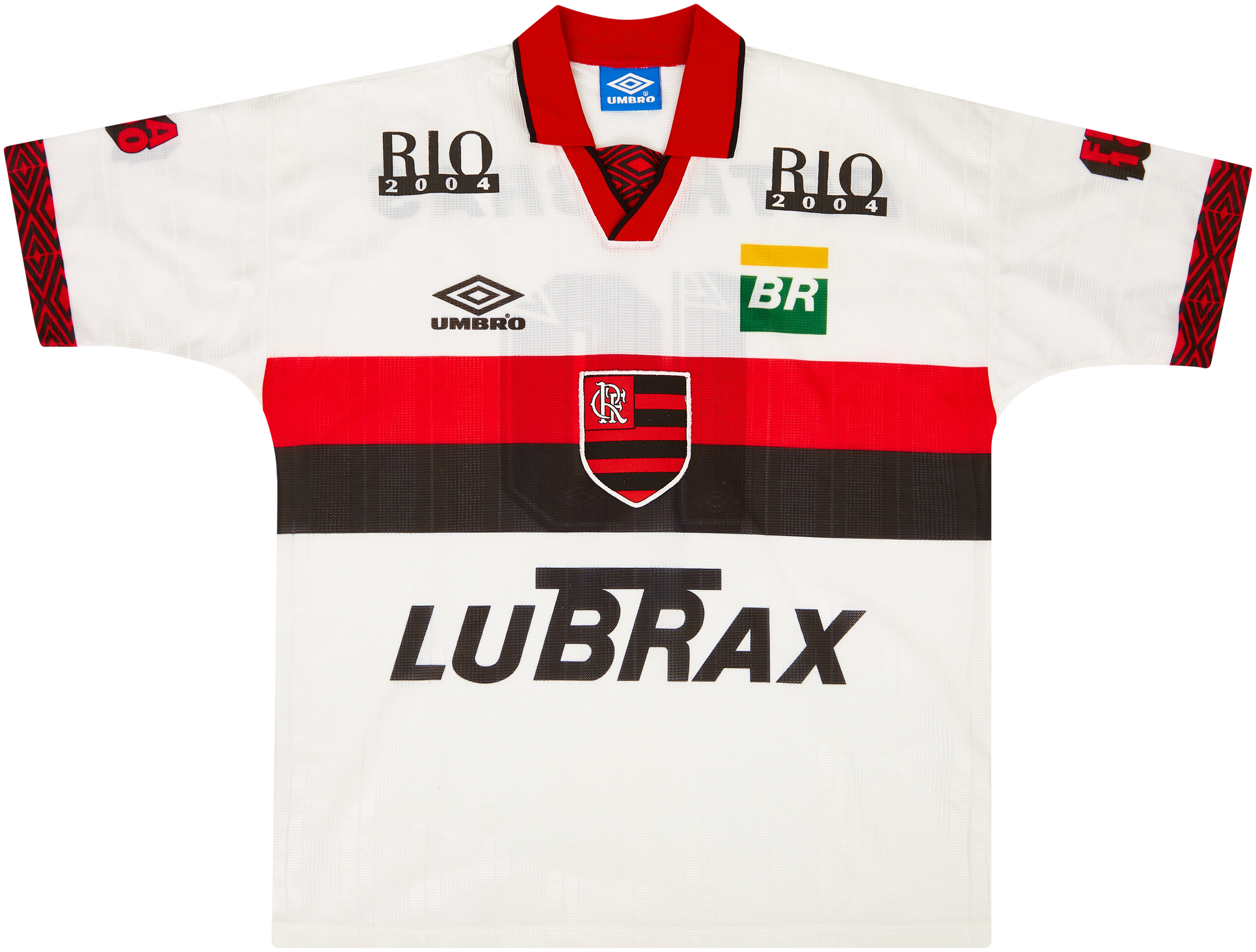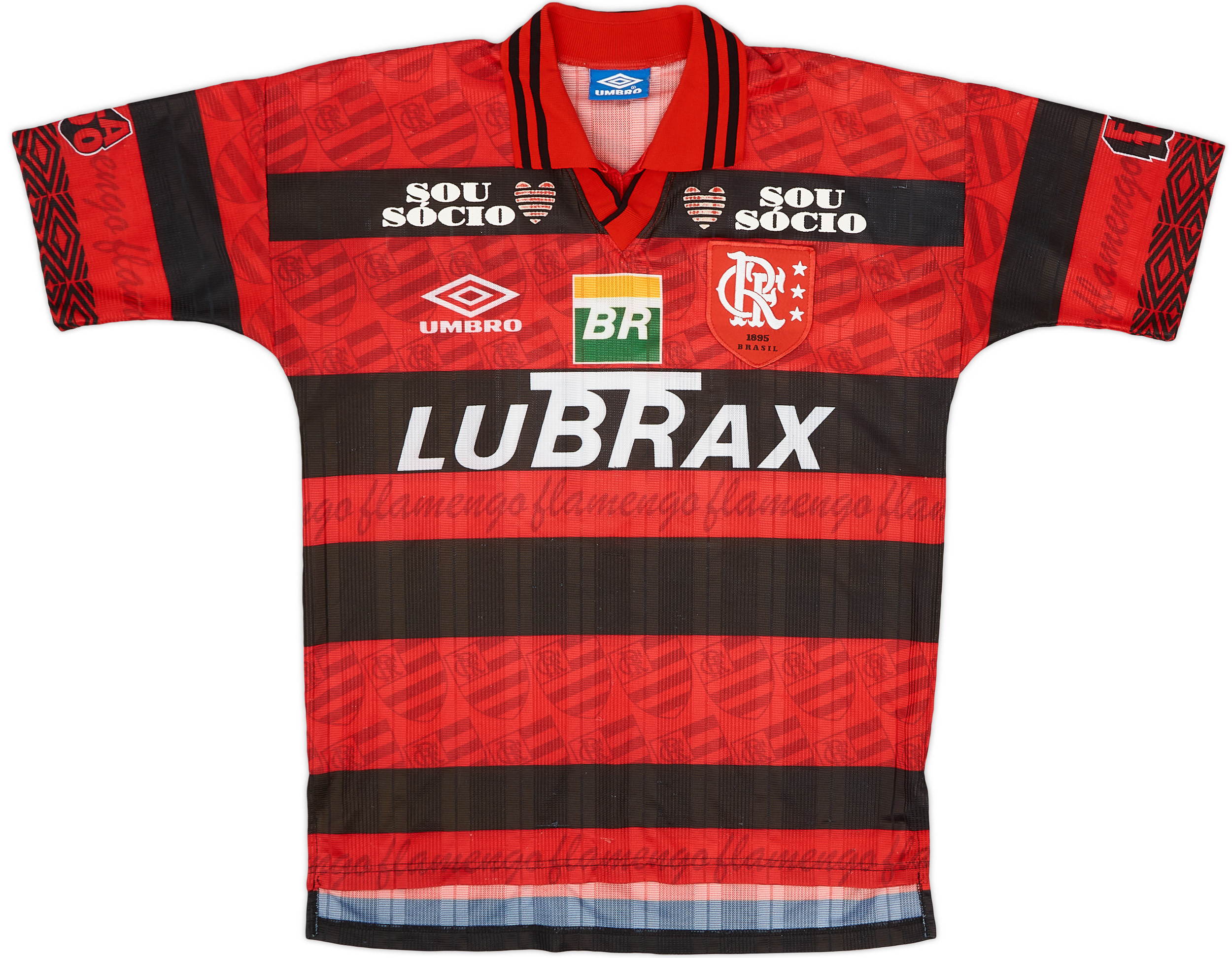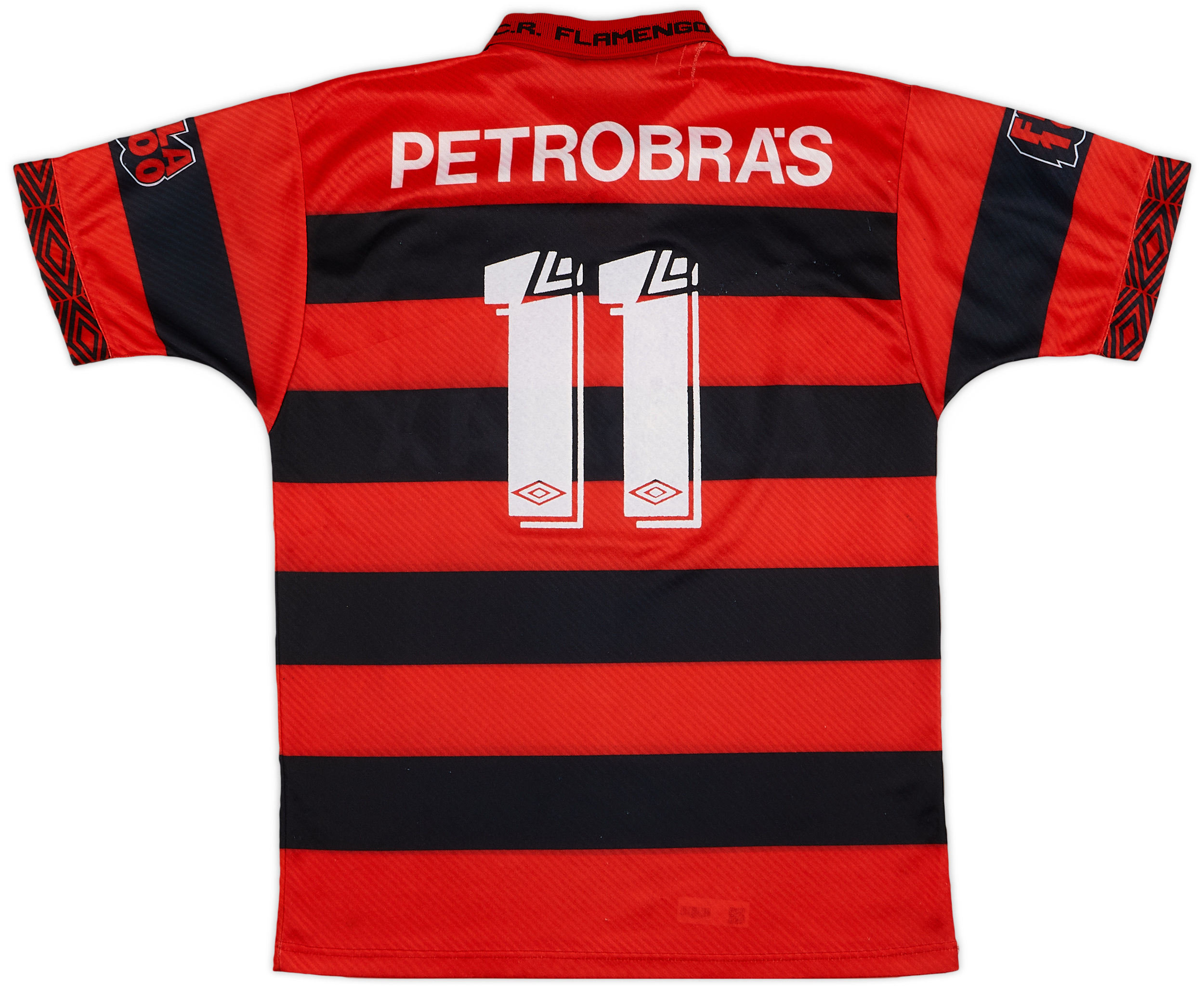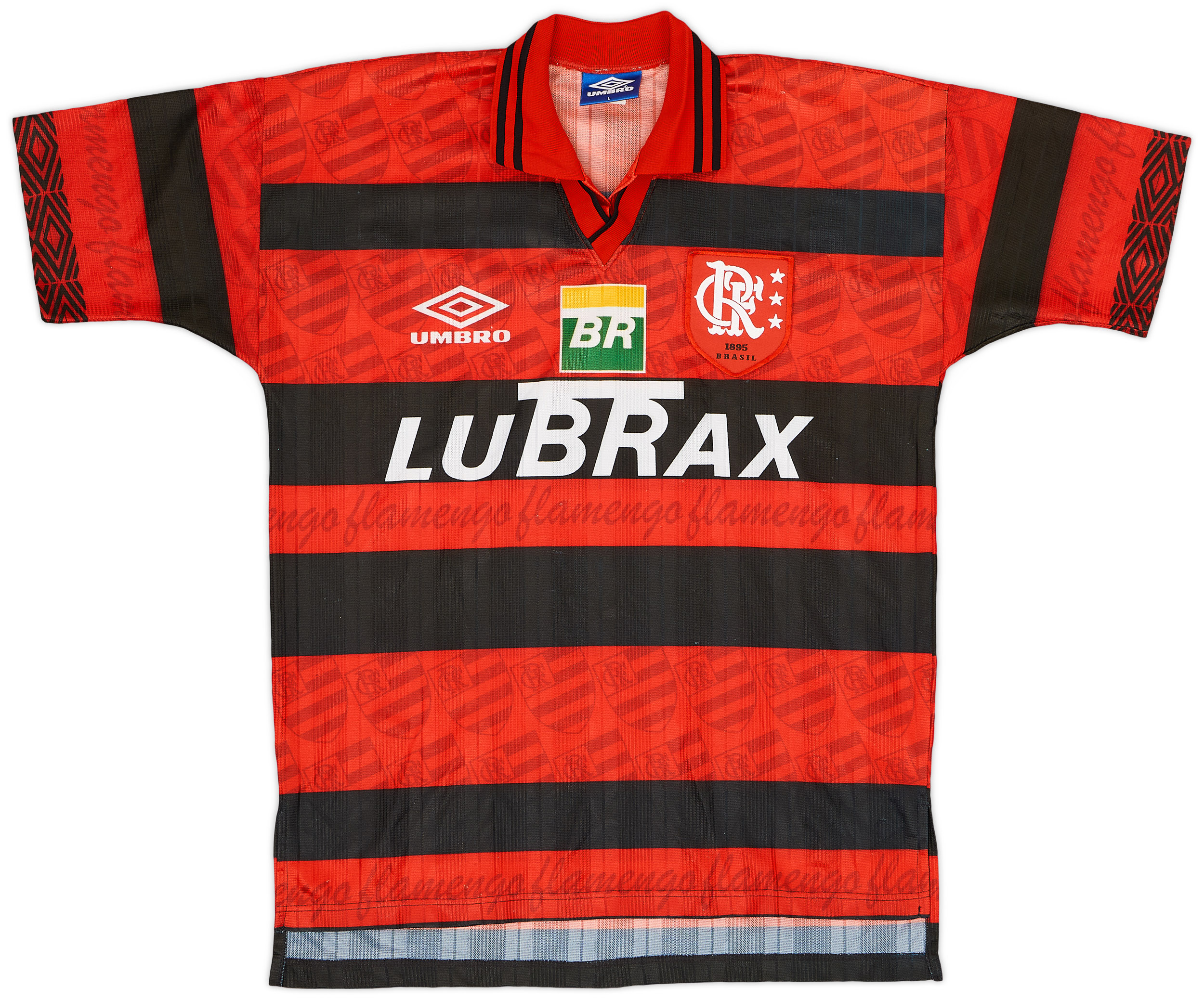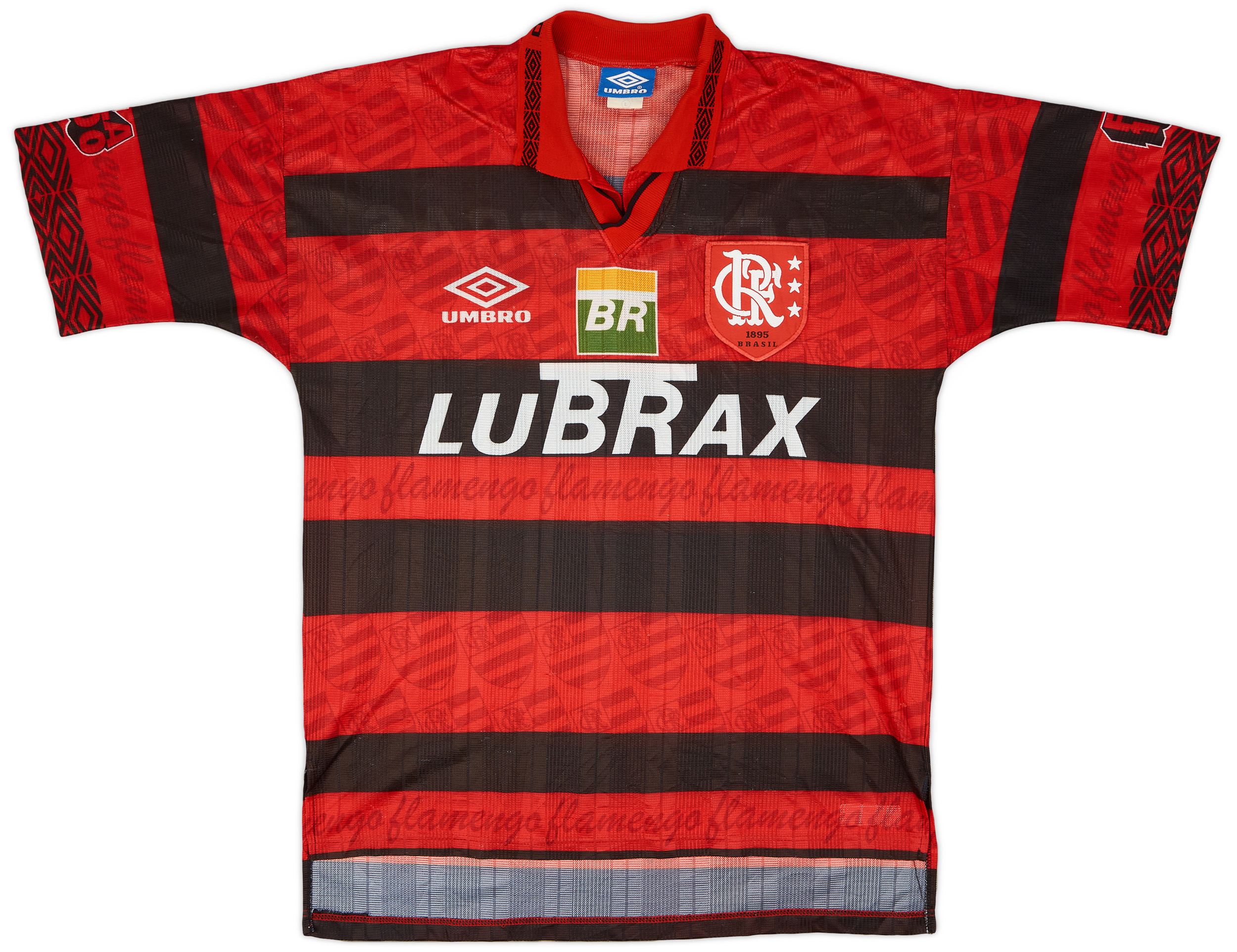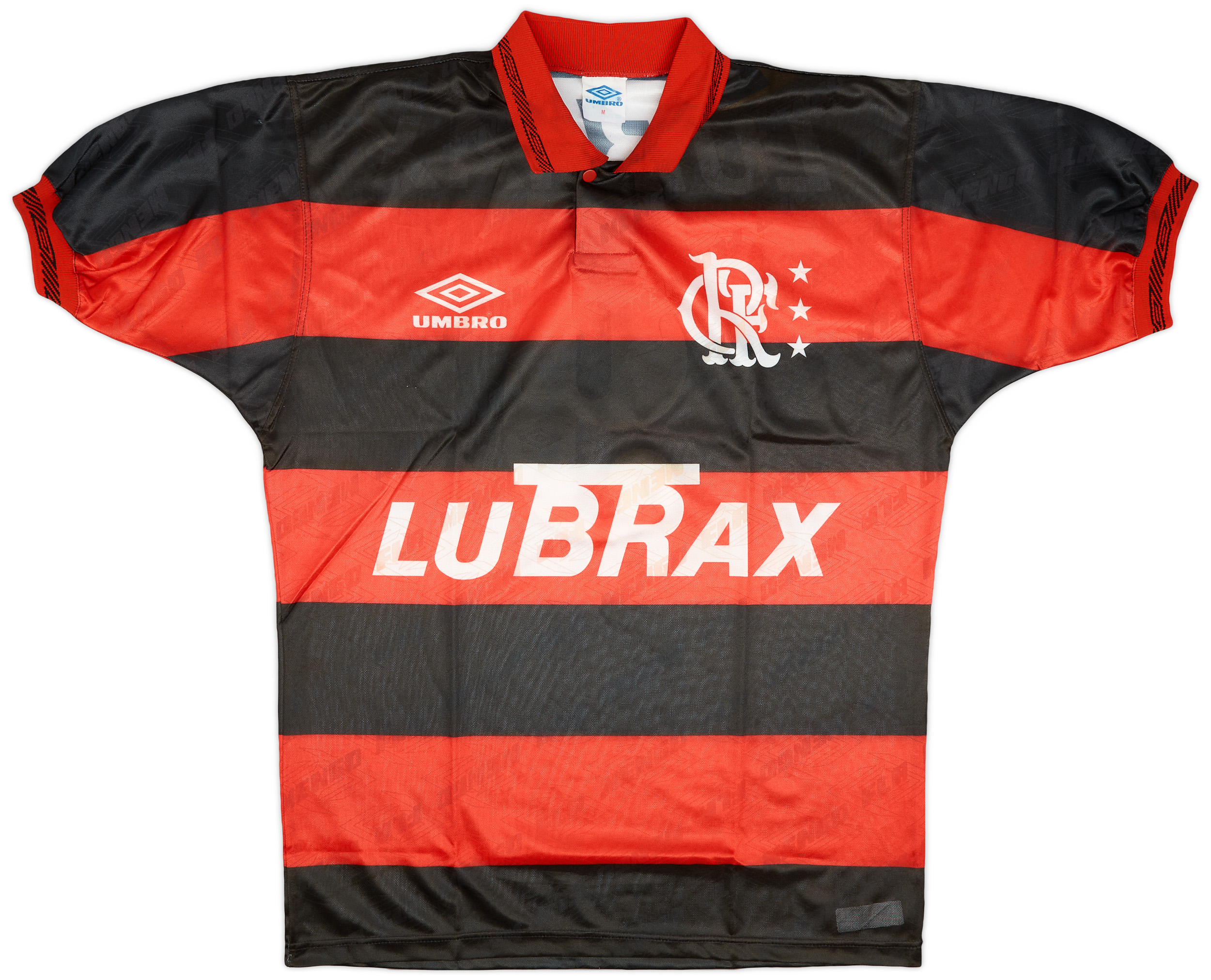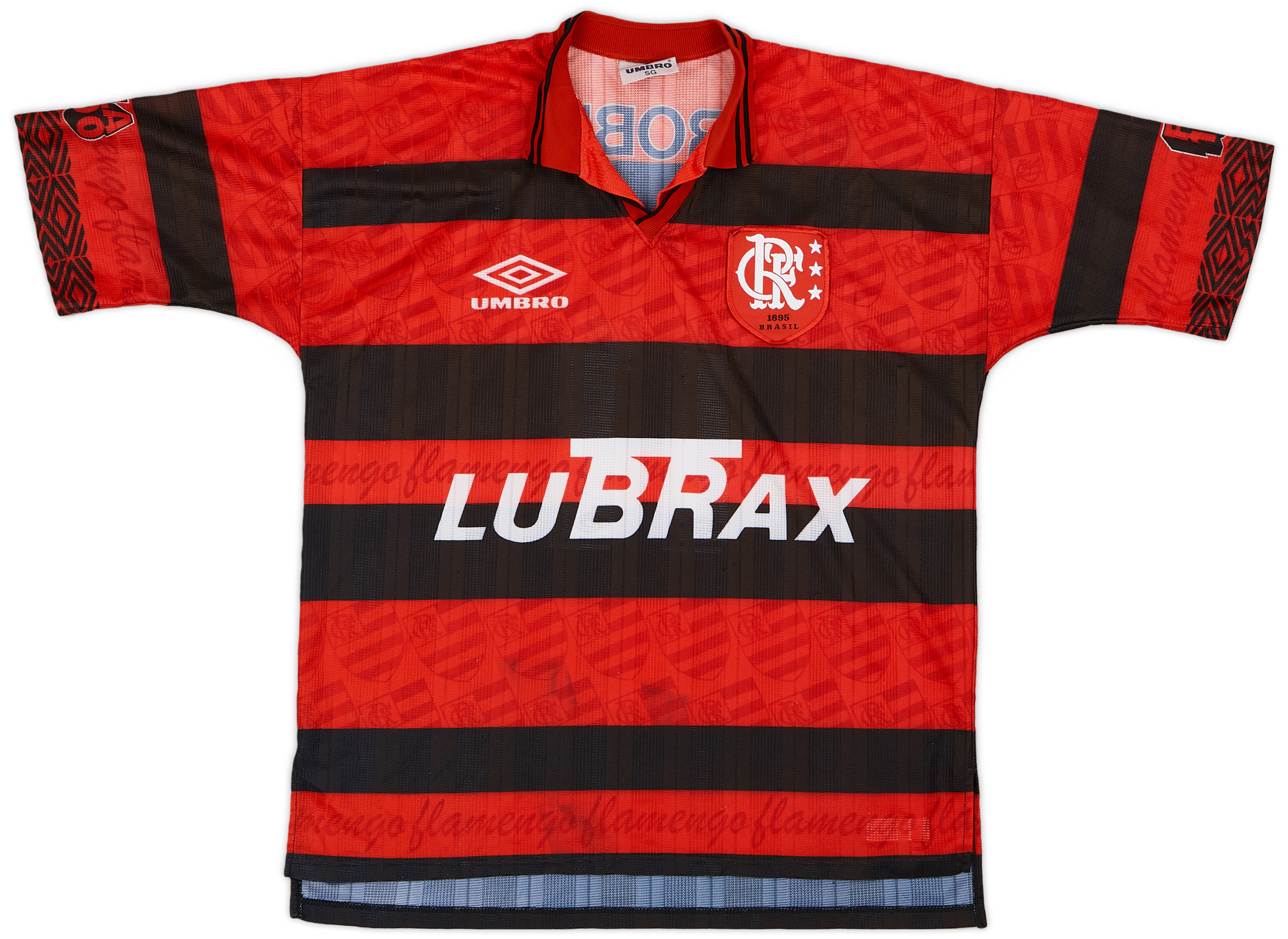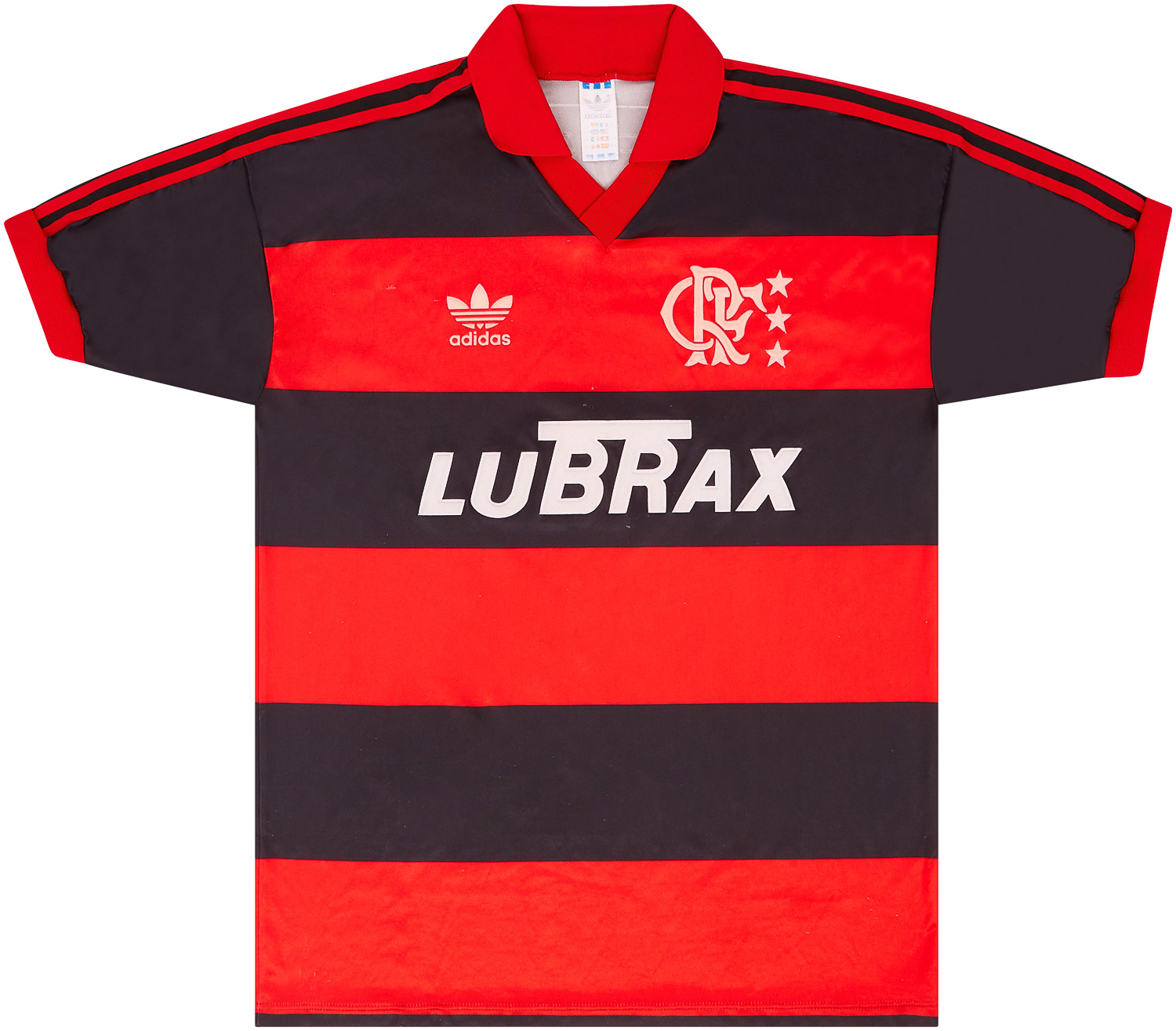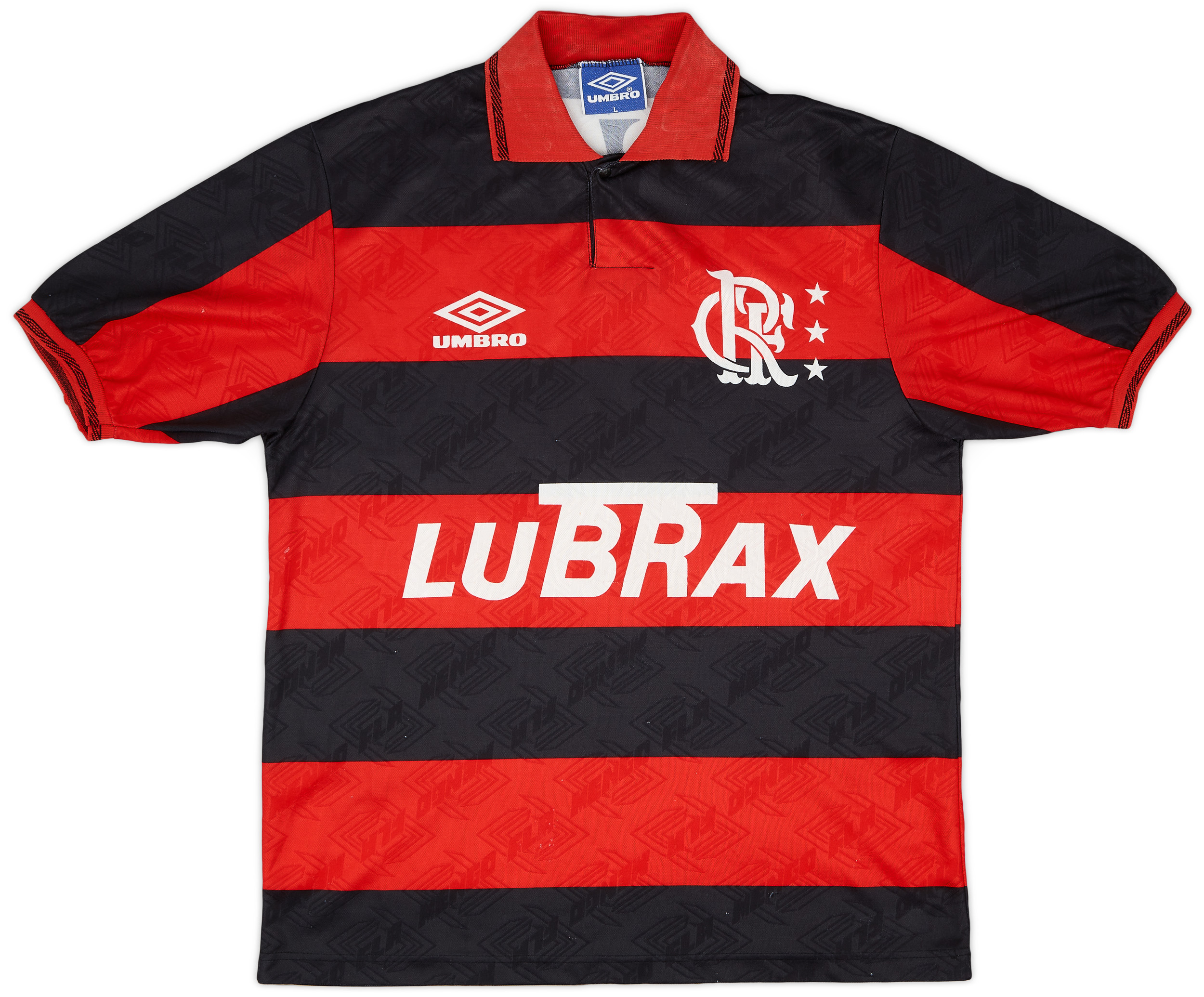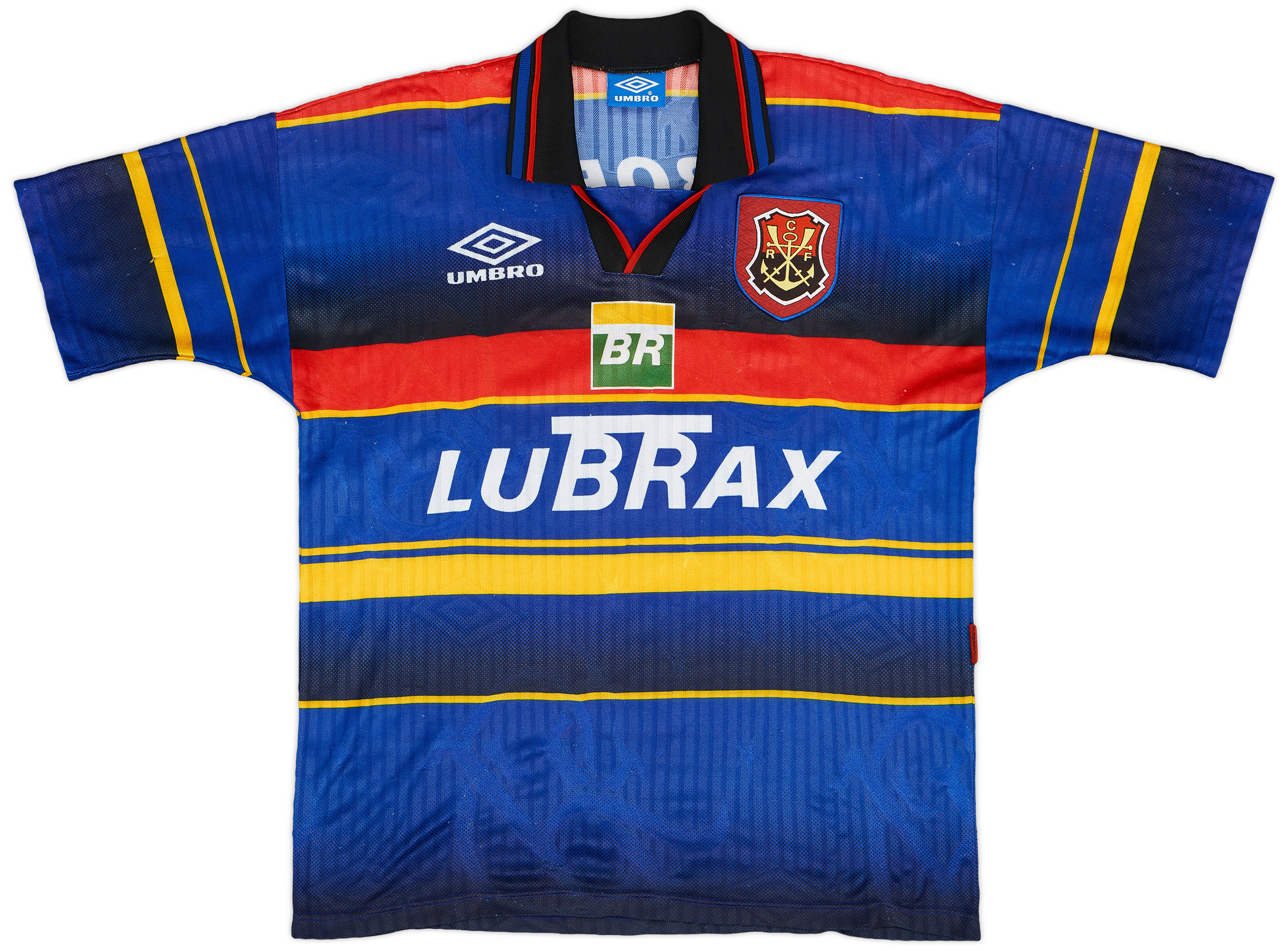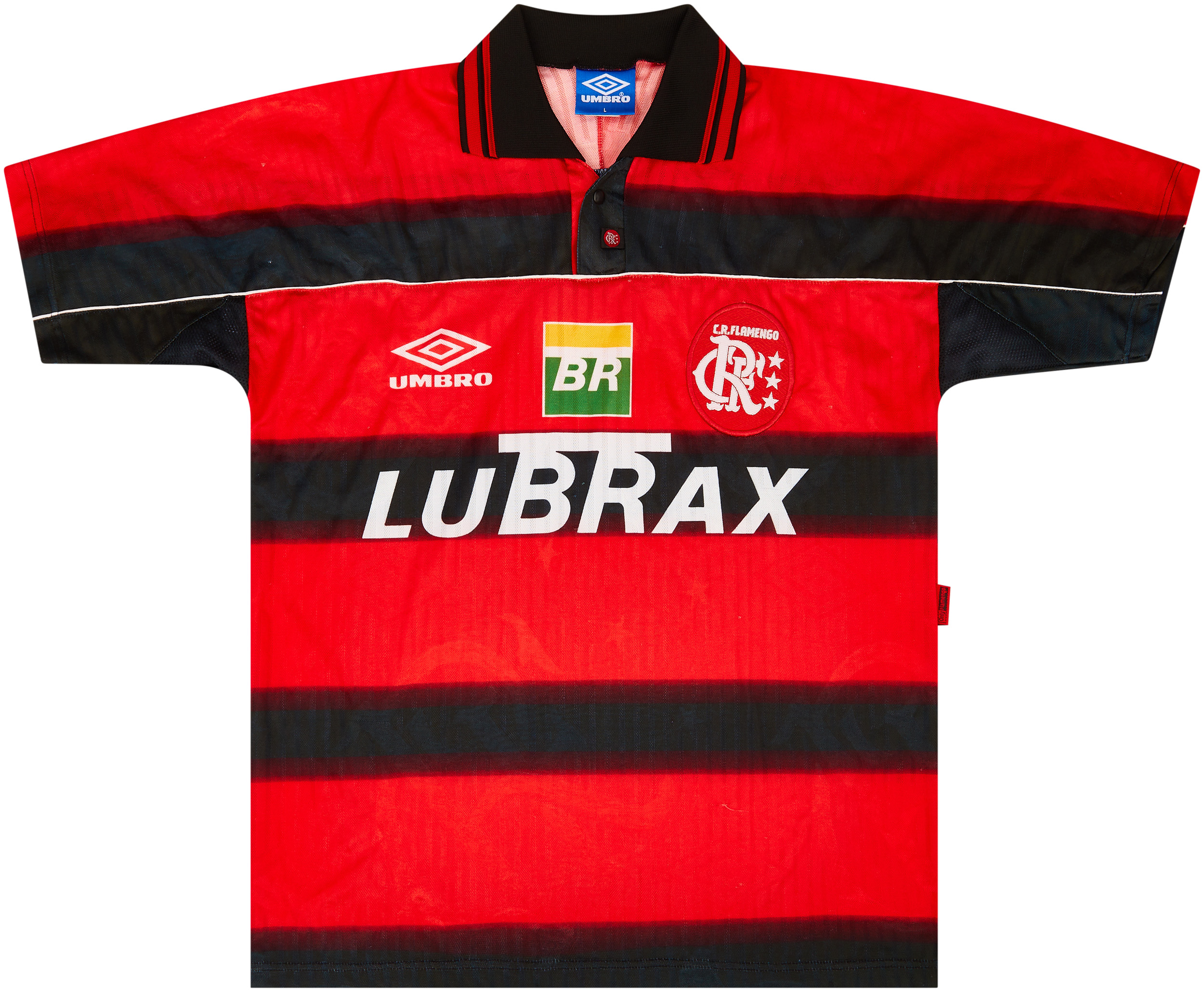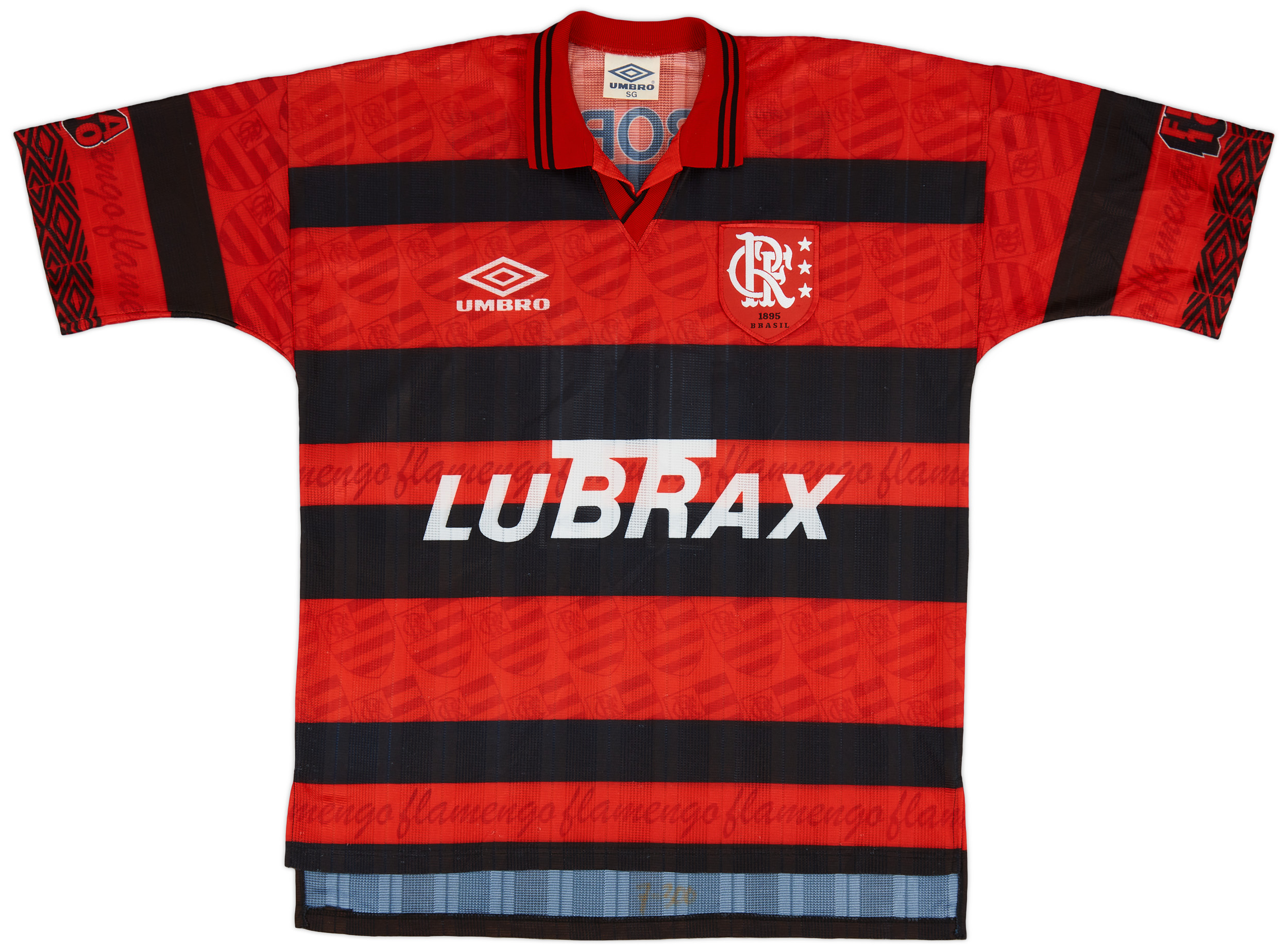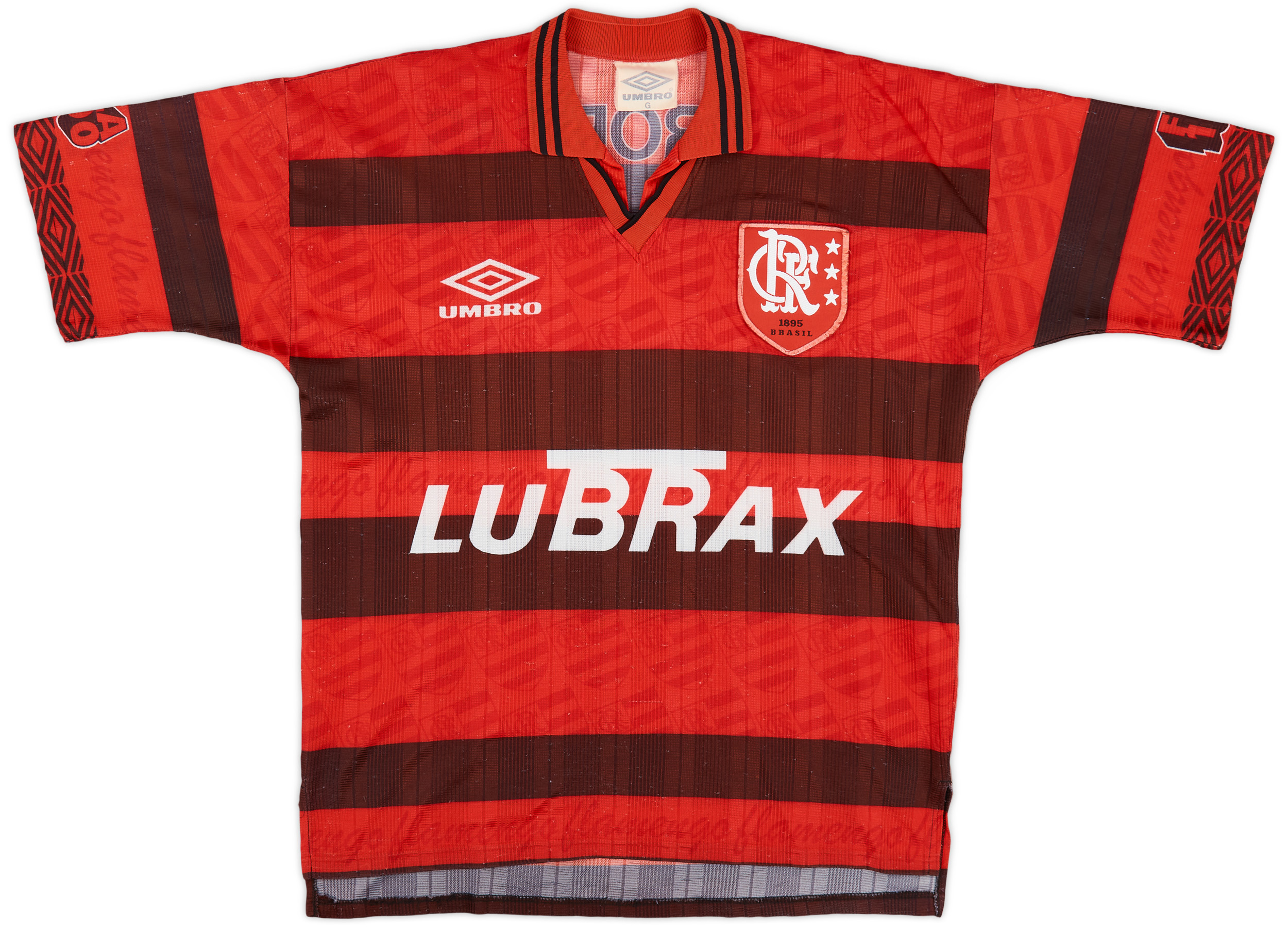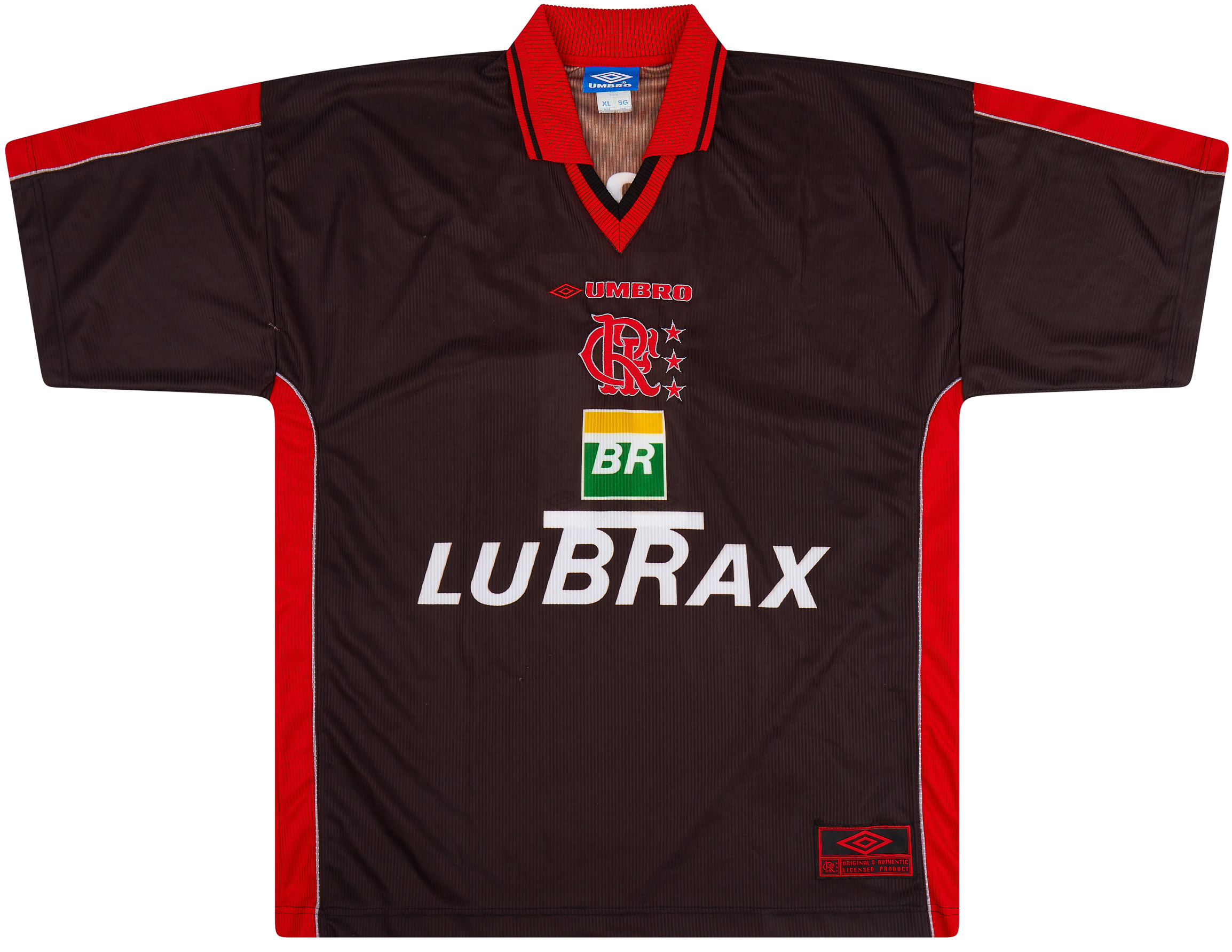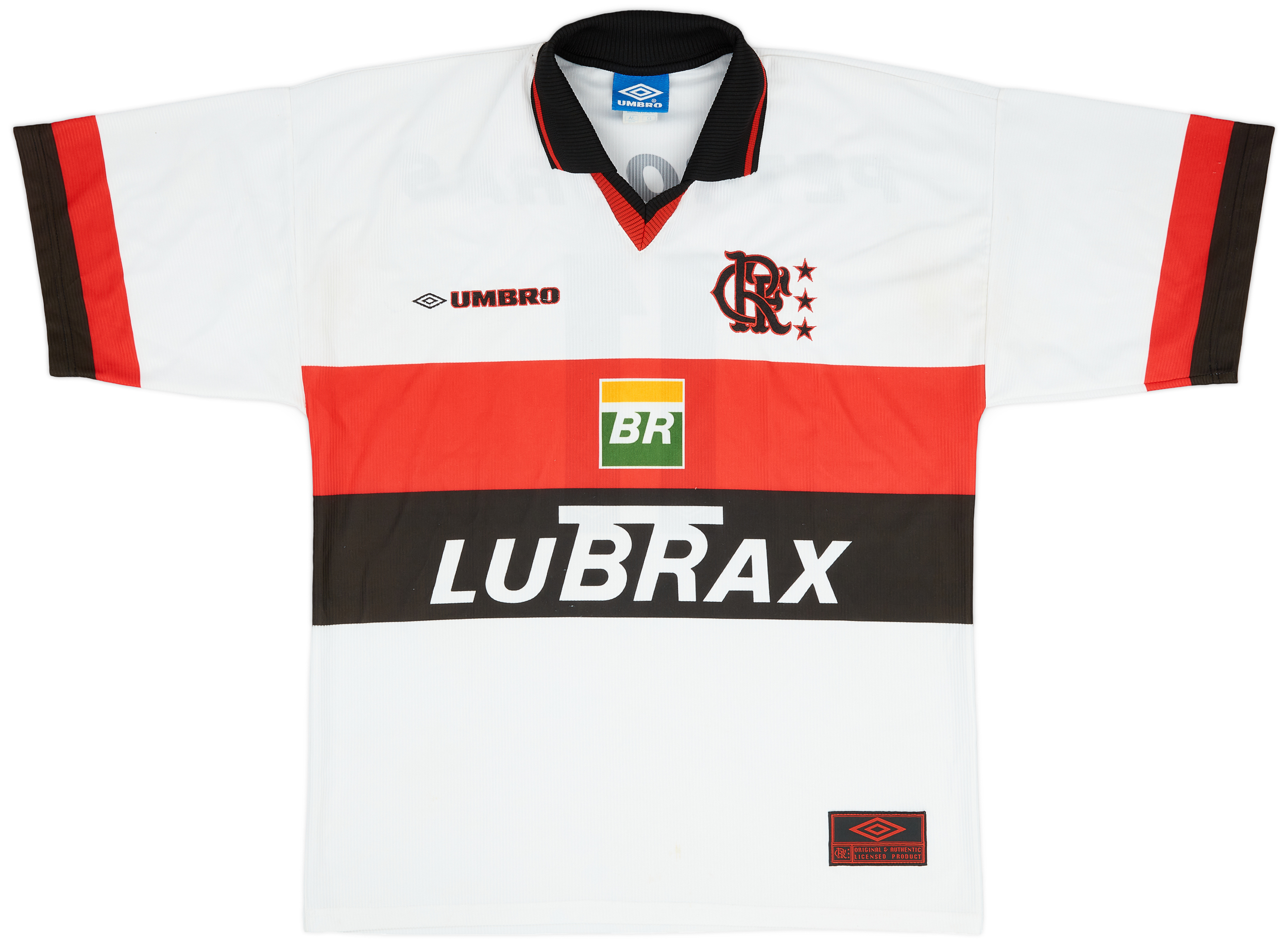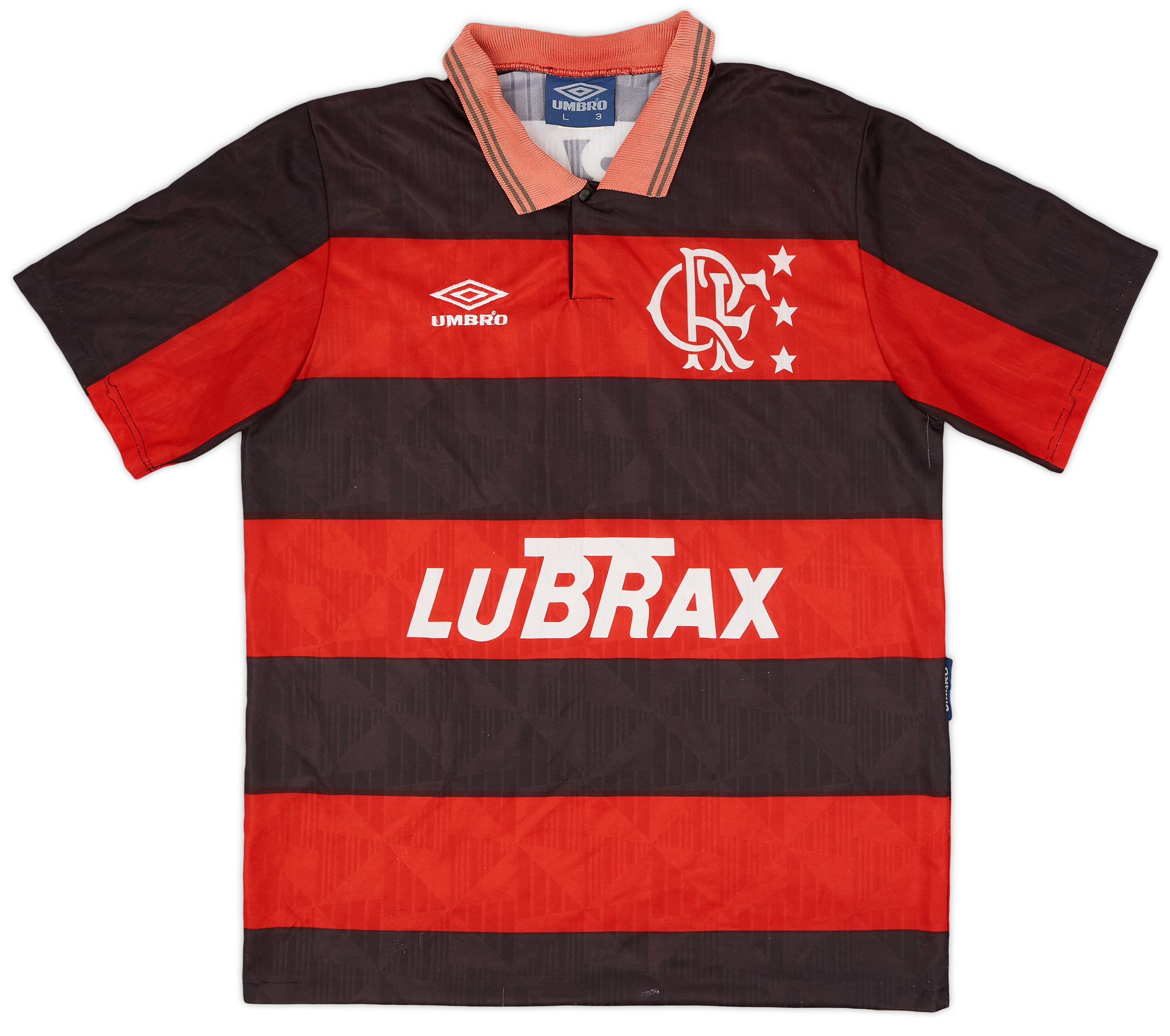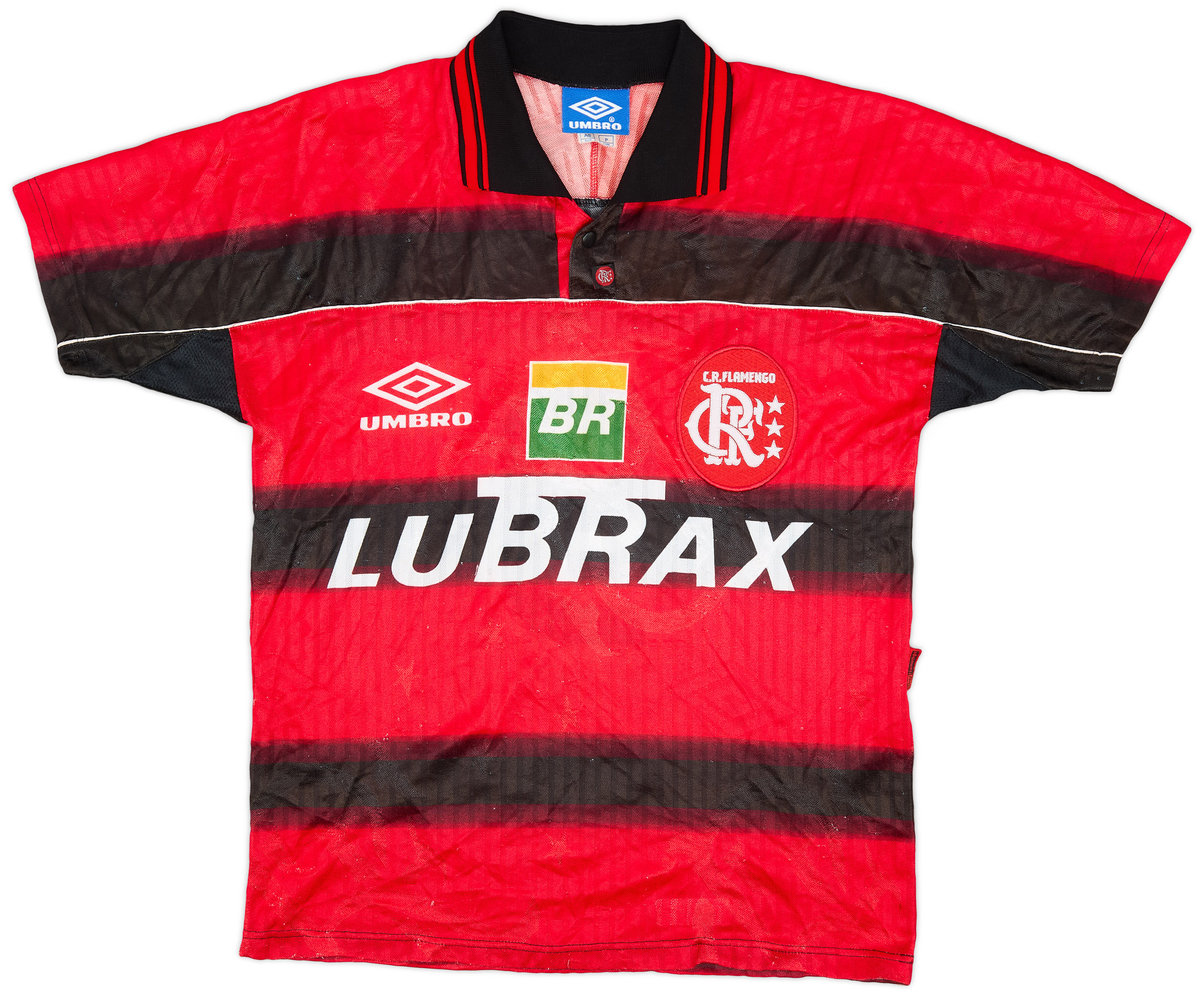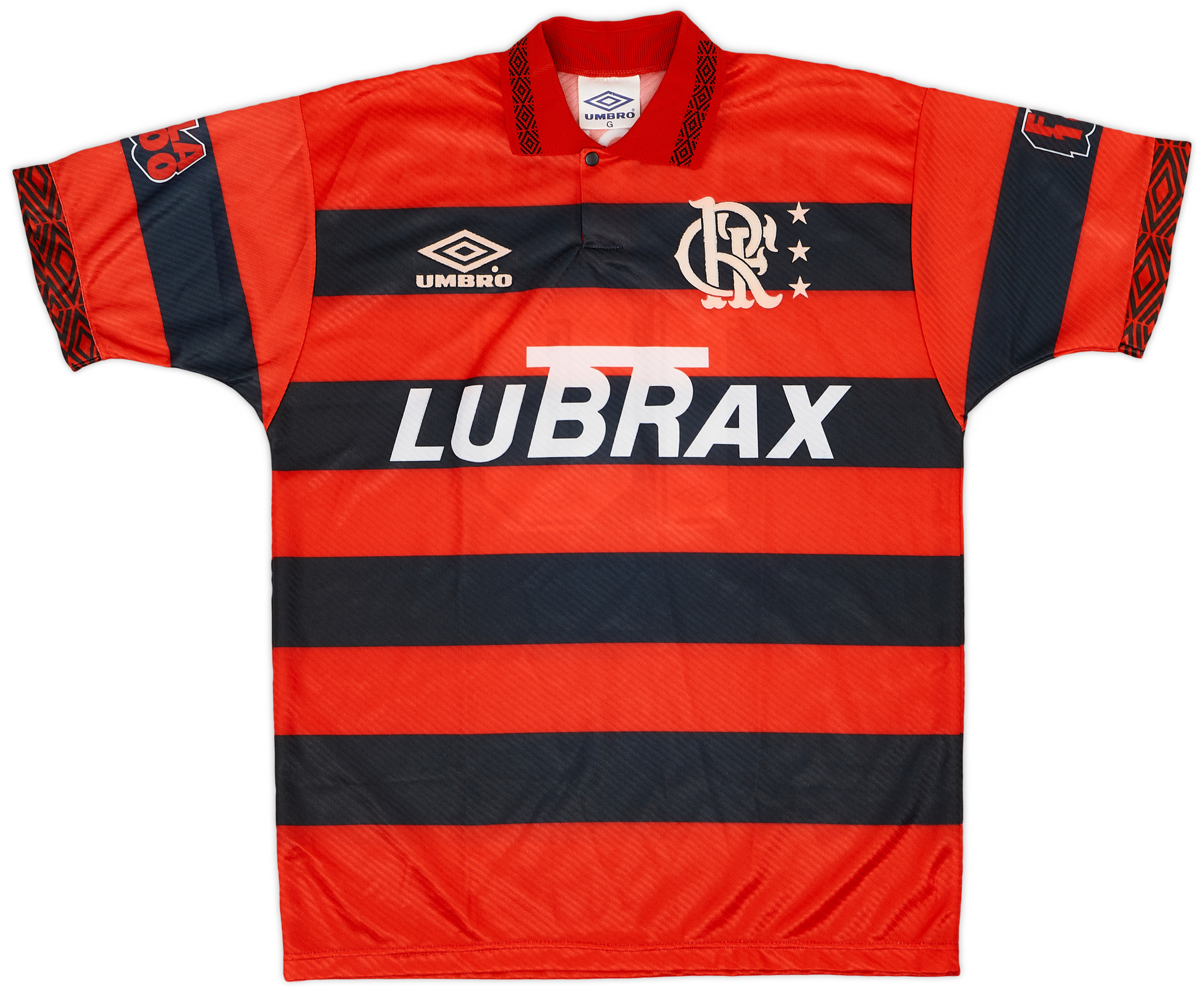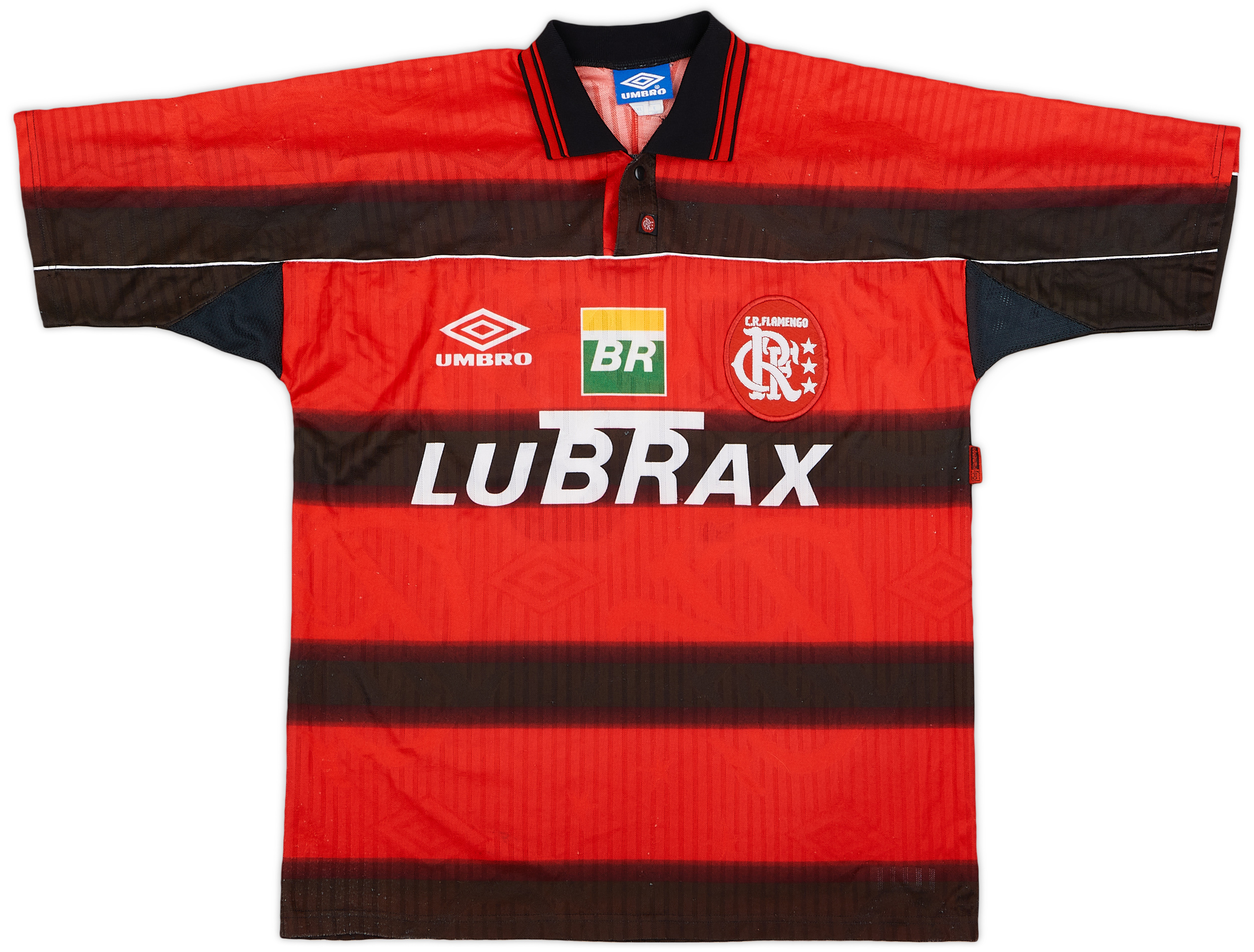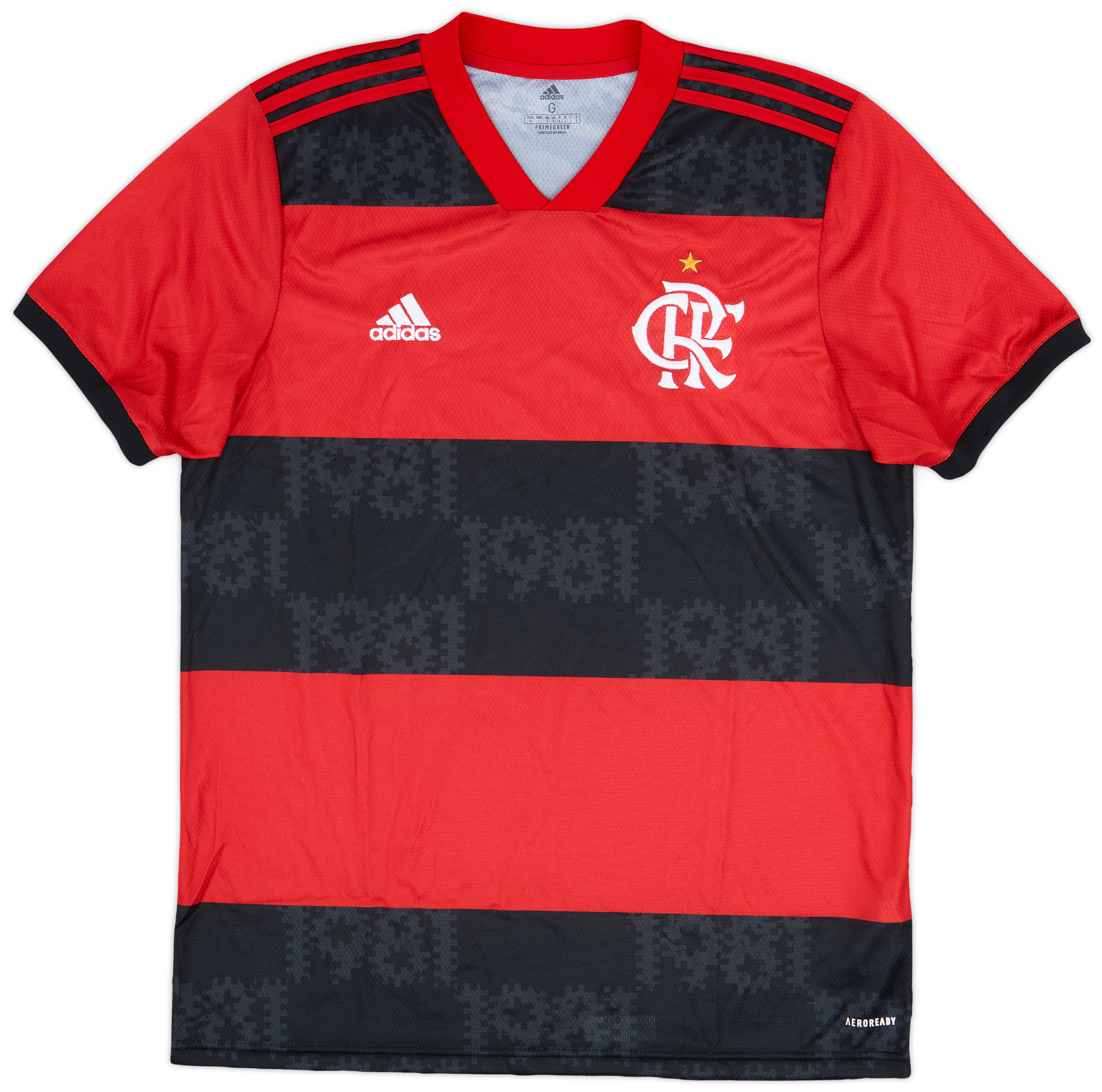Flamengo
Introduction Clube de Regatas do Flamengo, commonly known as Flamengo, is more than just a football club; it embodies a way of life for millions of fans, known as “Flamenguistas,” across Brazil and beyond. Founded in 1895 in Rio de Janeiro, Flamengo began as a rowing club before gradually evolving into a football powerhouse. With […]
1997-99 Flamengo Away Shirt #11 (Romario) (L)
356.99£ - ca: €421
2017 Flamengo Match Issue Signed Home Shirt Diego #35
356.99£ - ca: €421
1980 Flamengo Home Shirt - 8/10 - (M)
349.99£ - ca: €413
1987-90 Flamengo Home Shirt - 8/10 - (L)
324.99£ - ca: €383
1987-90 Flamengo Home Shirt #10 - 8/10 - (M)
296.99£ - ca: €350
1987-90 Flamengo Home Shirt - 8/10 - (L/XL)
296.99£ - ca: €350
1993-94 Flamengo Home L/S Shirt #7 - 8/10 - (L)
296.99£ - ca: €350
1993-94 Flamengo Signed Home Shirt #10 (L)
296.99£ - ca: €350
1998 Flamengo Home Shirt #11 (L)
296.99£ - ca: €350
1990-92 Flamengo Home Shirt - 8/10 - (L/XL)
237.99£ - ca: €281
1990-92 Flamengo Home Shirt - 8/10 - (L)
237.99£ - ca: €281
1990-92 Flamengo Home Shirt - 8/10 - (L/XL)
237.99£ - ca: €281
1990-92 Flamengo Home Shirt - 8/10 - (L/XL)
237.99£ - ca: €281
1990-92 Flamengo Home Shirt - 8/10 - (XL)
237.99£ - ca: €281
1989-90 Flamengo Home Shirt #10 - 7/10 - (M)
237.99£ - ca: €281
1990-92 Flamengo Home Shirt - 8/10 - (M/L)
237.99£ - ca: €281
1995-96 Flamengo Centenary Home Shirt #5 - 8/10 - (L)
226.99£ - ca: €268
1995-96 Flamengo Centenary Away Shirt #10 - 8/10 - (L)
207.99£ - ca: €245
1995-96 Flamengo Centenary Away Shirt #10 - 9/10 - (L)
207.99£ - ca: €245
1995-96 Flamengo Centenary Home Shirt #11 - 9/10 - (L)
207.99£ - ca: €245
1995-96 Flamengo Centenary Away Shirt - 8/10 - (L)
207.99£ - ca: €245
1995-96 Flamengo Centenary Home Shirt - 9/10 - (M)
207.99£ - ca: €245
1993-94 Flamengo Home Shirt #7 - 9/10 - (L)
207.99£ - ca: €245
1995-96 Flamengo Centenary Home Shirt - 9/10 - (L)
207.99£ - ca: €245
1992-93 Flamengo Home Shirt - 8/10 - (L)
207.99£ - ca: €245
1995-96 Flamengo Centenary Home Shirt #10 - 8/10 - (M)
207.99£ - ca: €245
1997-99 Flamengo Away Shirt #10 - 8/10 - (L)
207.99£ - ca: €245
1996-97 Flamengo Away Shirt - 10/10 - (L)
207.99£ - ca: €245
1995-96 Flamengo Centenary Home Shirt - 8/10 - (L)
207.99£ - ca: €245
1992-93 Flamengo Home Shirt - 9/10 - (L)
207.99£ - ca: €245
1995-96 Flamengo Centenary Home Shirt - 8/10 - (M)
207.99£ - ca: €245
1995-96 Flamengo Centenary Third Shirt #10 - 8/10 - (L)
207.99£ - ca: €245
1993-94 Flamengo Home Shirt #11 - 8/10 - (M)
207.99£ - ca: €245
1993 Flamengo Home Shirt - 9/10 - (L)
207.99£ - ca: €245
1993-94 Flamengo Away Shirt - 9/10 - (XL)
207.99£ - ca: €245
1990-92 Flamengo Home Shirt - 6/10 - (L/XL)
207.99£ - ca: €245
1995-96 Flamengo Centenary Home Shirt - 9/10 - (XL)
207.99£ - ca: €245
1995-96 Flamengo Centenary Home Shirt - 9/10 - (L)
207.99£ - ca: €245
1995-96 Flamengo Centenary Home Shirt #11 - 9/10 - (XL)
207.99£ - ca: €245
1995-96 Flamengo Centenary Home Shirt #10 - 9/10 - (L)
207.99£ - ca: €245
1993 Flamengo Home Shirt #9 - 9/10 - (XL)
207.99£ - ca: €245
1995-96 Flamengo Centenary Home Shirt - 9/10 - (L)
207.99£ - ca: €245
1995-96 Flamengo Centenary Home Shirt #7 - 8/10 - (XL)
207.99£ - ca: €245
1992-93 Flamengo Home Shirt #9 - 8/10 - (M)
207.99£ - ca: €245
1992-93 Flamengo Home Shirt #7 - 8/10 - (L)
207.99£ - ca: €245
1995-96 Flamengo Centenary Home Shirt - 9/10 - (L)
207.99£ - ca: €245
1995-96 Flamengo Centenary Home Shirt #7 - 9/10 - (L)
207.99£ - ca: €245
1993-94 Flamengo Home Shirt - 8/10 - (M)
207.99£ - ca: €245
1990-92 Flamengo Home Shirt #10 - 7/10 - (M/L)
207.99£ - ca: €245
1995-96 Flamengo Centenary Home Shirt #11 - 9/10 - (L)
207.99£ - ca: €245
1995-96 Flamengo Centenary Home Shirt - 8/10 - (L)
207.99£ - ca: €245
1995-96 Flamengo Centenary Home Shirt - 9/10 - (M)
207.99£ - ca: €245
1997-99 Flamengo Away Shirt #10 - 8/10 - (XL)
207.99£ - ca: €245
1990-92 Flamengo Home Shirt - 7/10 - (L/XL)
207.99£ - ca: €245
1995-96 Flamengo Centenary Home Shirt #11 - 9/10 - (M)
207.99£ - ca: €245
1992-93 Flamengo Home Shirt - 8/10 - (L)
207.99£ - ca: €245
1997-99 Flamengo Away Shirt #11 - 8/10 - (L)
207.99£ - ca: €245
1995-96 Flamengo Centenary Third Shirt - 9/10 - (XL)
207.99£ - ca: €245
1995-96 Flamengo Centenary Away Shirt #10 - 8/10 - (L)
207.99£ - ca: €245
1995-96 Flamengo Centenary Home Shirt - 9/10 - (L)
207.99£ - ca: €245
1995-96 Flamengo Centenary Away Shirt - 9/10 - (L)
207.99£ - ca: €245
1995-96 Flamengo Centenary Away Shirt #11 - 8/10 - (XL)
207.99£ - ca: €245
1994-95 Flamengo Centenary Home Shirt - 8/10 - (XL)
194.99£ - ca: €230
1997-98 Flamengo Home Shirt - 9/10 - (L)
177.99£ - ca: €210
1997-99 Flamengo Home Shirt #5 - 9/10 - (L)
177.99£ - ca: €210
1994-95 Flamengo Centenary Home Shirt #10 - 8/10 - (L)
177.99£ - ca: €210
1996-97 Flamengo Home Shirt - 8/10 - (M)
177.99£ - ca: €210
1994-95 Flamengo Centenary Home Shirt #11 - 9/10 - (XL)
177.99£ - ca: €210
1995-96 Flamengo Centenary Home Shirt #10 - 6/10 - (L)
177.99£ - ca: €210
1992-93 Flamengo Home Shirt - 7/10 - (L)
177.99£ - ca: €210
1994-95 Flamengo Centenary Home Shirt #11 - 9/10 - (M)
177.99£ - ca: €210
1999 Flamengo Third Shirt #11 (Romario) - 9/10 - (XL)
177.99£ - ca: €210
1999 Flamengo Away Shirt #11 (Romario) - 8/10 - (L)
177.99£ - ca: €210
1994-95 Flamengo Centenary Home Shirt - 8/10 - (L)
177.99£ - ca: €210
1994-95 Flamengo Centenary Home Shirt #7 - 8/10 - (L)
177.99£ - ca: €210
1992-93 Flamengo Home Shirt - 6/10 - (L)
177.99£ - ca: €210
1997-99 Flamengo Home Shirt #9 - 8/10 - (S)
177.99£ - ca: €210
1994-95 Flamengo Centenary Home Shirt #10 - 9/10 - (M)
177.99£ - ca: €210
1994-95 Flamengo Centenary Home Shirt #10 - 9/10 - (L)
177.99£ - ca: €210
2002-04 Flamengo Home Shirt #10 (L)
177.99£ - ca: €210
1999 Flamengo Away Shirt #10 (Iranildo)- 8/10 - (M)
177.99£ - ca: €210
1996-97 Flamengo Away Shirt - 9/10 - (XL)
177.99£ - ca: €210
1994-95 Flamengo Centenary Home Shirt - 9/10 - (L)
177.99£ - ca: €210
1996-97 Flamengo Away Shirt - 9/10 - (L)
177.99£ - ca: €210
1994-95 Flamengo Centenary Home Shirt - 8/10 - (XL)
177.99£ - ca: €210
1995-96 Flamengo Centenary Away Shirt - 8/10 - (L)
177.99£ - ca: €210
1992-93 Flamengo Home Shirt #7 - 7/10 - (L)
177.99£ - ca: €210
1996-97 Flamengo Away Shirt - 9/10 - (M)
177.99£ - ca: €210
1994-95 Flamengo Centenary Home Shirt #10 - 8/10 - (L)
177.99£ - ca: €210
1996-97 Flamengo Away Shirt - 8/10 - (XL)
177.99£ - ca: €210
1994-95 Flamengo Centenary Home Shirt #8 - 9/10 - (L)
177.99£ - ca: €210
1997-99 Flamengo Home Shirt - 9/10 - (XL)
177.99£ - ca: €210
1997-99 Flamengo Home Shirt #11 - 9/10 - (S)
177.99£ - ca: €210
1996-97 Flamengo Away Shirt - 8/10 - (L)
177.99£ - ca: €210
1997-99 Flamengo Home Shirt #10 - 9/10 - (XL)
177.99£ - ca: €210
1994-95 Flamengo Centenary Home Shirt #11 - 9/10 - (L)
177.99£ - ca: €210
1995-96 Flamengo Centenary Away Shirt - 6/10 - (L)
161.99£ - ca: €191
1996-97 Flamengo Away Shirt - 7/10 - (XL)
148.99£ - ca: €176
1994-95 Flamengo Centenary Home Shirt #7 - 7/10 - (L)
148.99£ - ca: €176
2004 Flamengo Away Shirt #10 - 8/10 - (M)
148.99£ - ca: €176
2005 Flamengo Away Shirt #10 - 9/10 - (S)
148.99£ - ca: €176
2002-04 Flamengo Nike Track Jacket - 9/10 - (L)
148.99£ - ca: €176
2004 Flamengo Away Shirt #10 - 8/10 - (M)
148.99£ - ca: €176
1995-96 Flamengo Centenary Away Shirt #10 - 7/10 - (L)
148.99£ - ca: €176
1994-95 Flamengo Centenary Home Shirt - 6/10 - (L)
148.99£ - ca: €176
1999 Flamengo Home Shirt #10 - 8/10 - (M)
148.99£ - ca: €176
1994-95 Flamengo Centenary Home Shirt #10 - 6/10 - (L)
148.99£ - ca: €176
1994-95 Flamengo Centenary Home Shirt #9 - 6/10 - (L)
148.99£ - ca: €176
2004 Flamengo Away Shirt #9 - 8/10 - (L)
148.99£ - ca: €176
1997-99 Flamengo Home Shirt - 7/10 - (L)
148.99£ - ca: €176
2021 Flamengo Special 'Pride' Shirt #10 (Diego) (S)
148.99£ - ca: €176
1994-95 Flamengo Centenary Home Shirt - 7/10 - (L)
148.99£ - ca: €176
1999 Flamengo Home Shirt #11 - 8/10 - (L)
148.99£ - ca: €176
1997-99 Flamengo Away Shirt - 7/10 - (L)
124.99£ - ca: €147
2022 Flamengo Home Shirt Pedro #21 (XL)
118.99£ - ca: €140
1992-93 Flamengo Home Shirt - 7/10 - (L)
118.99£ - ca: €140
2002-03 Flamengo Away Shirt #10 - 6/10 - (L)
118.99£ - ca: €140
2022 Flamengo Home Shirt B. Henrique #27 (XL)
118.99£ - ca: €140
2000-01 Flamengo Away Shirt #8 - 7/10 - (L)
118.99£ - ca: €140
1990-92 Flamengo Home Shirt - 5/10 - (L)
118.99£ - ca: €140
1995-96 Flamengo Centenary Home Shirt #7 - 5/10 - (L)
106.99£ - ca: €126
2002-04 Flamengo Home Shirt - 8/10 - (L)
94.99£ - ca: €112
2012 Flamengo Away Shirt - 8/10 - (M)
94.99£ - ca: €112
2002-04 Flamengo Home Shirt - 9/10 - (L)
94.99£ - ca: €112
2021 Flamengo Home Shirt - 9/10 - (L)
94.99£ - ca: €112
2007 Flamengo Home Shirt #10 - 7/10 - (M)
94.99£ - ca: €112
2005 Flamengo Home Shirt #10 - 8/10 - (XL)
94.99£ - ca: €112
2024-25 Flamengo Home Shirt
94.99£ - ca: €112
2012 Flamengo Away Shirt - 7/10 - (S)
82.99£ - ca: €98
2000-01 Flamengo Away Shirt #7 - 5/10 - (XL)
82.99£ - ca: €98
2000-01 Flamengo Away Shirt #10 - 5/10 - (L)
82.99£ - ca: €98
2002-04 Flamengo Home Shirt #10 - 8/10 - (L)
79.99£ - ca: €94
2023-24 Flamengo adidas Woven Track Jacket
70.99£ - ca: €84
2023 Flamengo Home Shirt
58.99£ - ca: €70
2012 Flamengo GK Shirt #1 - 7/10 - (L)
58.99£ - ca: €70
2023-24 Flamengo adidas 1/4 Zip Training Top
31.99£ - ca: €38
2023-24 Flamengo adidas Training Pants/Bottoms
23.99£ - ca: €28
Warning: A non-numeric value encountered in /var/www/netskribent.dk/retro-football-shirt.com/wp-content/themes/boot5/single-clubs.php on line 148
Introduction
Clube de Regatas do Flamengo, commonly known as Flamengo, is more than just a football club; it embodies a way of life for millions of fans, known as “Flamenguistas,” across Brazil and beyond. Founded in 1895 in Rio de Janeiro, Flamengo began as a rowing club before gradually evolving into a football powerhouse. With its striking red and black colors, Flamengo has become a symbol of pride and passion in Brazilian football, capturing the hearts of many with its rich history and unprecedented on-field success.
Club History
Flamengo was officially founded on November 17, 1895, initially focusing on rowing. It wasn’t until 1911 that the club embraced football, marking the beginning of a new era. Flamengo played its first official football match in 1912 and quickly made its mark on Brazilian football. The club’s famous Maracanã Stadium, inaugurated in 1950, has become a fortress for the team and a landmark for football in Brazil. Over the decades, Flamengo has witnessed numerous transformations and challenges, solidifying its status as a staple of Brazilian culture.
Achievements
Flamengo boasts an impressive list of achievements, both domestically and internationally. Domestically, the club has won the Campeonato Brasileiro Série A (Brazilian Championship) a record seven times, with their latest title occurring in 2019. Flamengo has also secured the Copa do Brasil multiple times, with victories in 1990, 2006, and 2013 among others. Internationally, the club shone in the Copa Libertadores, South America’s most prestigious club competition, clinching the title in 1981 and 2019. The 1981 victory is especially memorable, as Flamengo defeated Coba and established itself as one of the continent’s elite teams by winning the Intercontinental Cup against Liverpool the same year.
Significant Players and Matches
Throughout its storied history, Flamengo has been home to many iconic players who have left lasting legacies. Stars such as Zico, known as “The Little Genius,” showcased remarkable talent during the 1970s and 80s and is considered one of the greatest Brazilian footballers of all time. Other notable players include Júnior, a legendary defender and captain, and more recent stars like Gabriel Barbosa (“Gabigol”), who played a pivotal role in the club’s 2019 Copa Libertadores triumph. Flamengo’s matches against rivals like Fluminense, Vasco da Gama, and Botafogo, known collectively as the “Classicos,” are always filled with intensity and passion, marking some of the most historic moments in Brazilian football.
Cultural Impact
Flamengo’s influence extends far beyond the pitch; it has woven itself into the socio-cultural fabric of Brazil. The club’s massive fanbase, estimated to be over 40 million supporters, fuels an environment of unwavering passion and loyalty. The famous chant of “Mengão” resonates throughout Rio de Janeiro and across the country, igniting a sense of belonging among supporters. Flamengo’s community engagement initiatives and social programs reflect its commitment to social responsibility, bridging the gap between sports and local communities. The club also plays a significant role in Brazilian Carnival, inspiring vibrant parades and cultural celebrations that underscore its presence in everyday life.
Conclusion
As one of the most celebrated football clubs in Brazil and a central figure in the history of South American football, Flamengo’s legacy is profound. Its exceptional achievements on the pitch, iconic players, and passionate fanbase highlight its importance not just in Brazil, but in the global football community. Flamengo continues to inspire and unite fans, making it a timeless symbol of Brazilian pride and excellence in football history.
